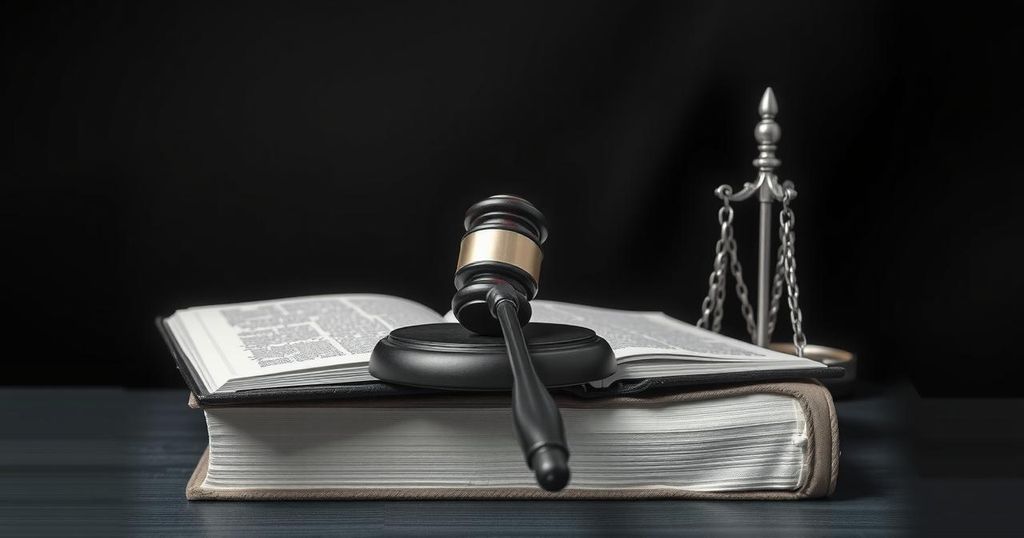Crime
ASIA, CORRUPTION, CRIME, DAVAO, EAST, EAST ASIA, EXTRADITION, HONG KONG, ICC, INTERNATIONAL COALITION FOR HUMAN RIGHTS, INTERNATIONAL CRIMINAL COURT, JOEL GUINTO, JONATHAN HEAD, JUSTICE, MANILA, PETER MURPHY, PHILIPPINES, RODRIGO DUTERTE, SENTENCING, SOUTH EAST ASIA, VERONICA DUTERTE, VILLAMOR, VILLAMOR AIR BASE
Sofia Rodriguez
0 Comments
Former Philippine President Duterte Arrested Under ICC Warrant for Drug War Crimes
Rodrigo Duterte, former President of the Philippines, was arrested under an ICC warrant for crimes against humanity related to his drug war. He questions the legality of the warrant, arguing he acted for the peace of his country. The arrest is viewed as a significant step toward justice by activists. Duterte remains a controversial figure, maintaining popularity while dealing with his family’s political complexities amid changing relations with the current government.
Rodrigo Duterte, former President of the Philippines, was arrested by police upon his return to Manila from Hong Kong following an International Criminal Court (ICC) warrant for crimes against humanity linked to his “war on drugs.” The arrest occurred shortly after landing at the airport, and Duterte, now 79 years old, has made no apologies for the violent crackdown during his presidency from 2016 to 2022. He questioned the rationale behind the warrant, stating, “What crime [have] I committed?”.
Duterte’s former spokesperson, Salvador Panelo, criticized the arrest as “unlawful,” arguing that the Philippines had withdrawn from ICC jurisdiction in 2019. However, the ICC maintained it retains authority over actions that occurred prior to this withdrawal. Activist organizations, including the International Coalition for Human Rights in the Philippines, hailed the arrest as a significant moment for justice concerning the victims of Duterte’s drug war. ICHRP Chairperson Peter Murphy stated, “The arc of the moral universe is long, but today, it has bent towards justice.”
During his Hong Kong trip, Duterte was campaigning for the May 12 mid-term elections, aiming to return as mayor of Davao City. He was seen utilizing a cane as he exited the airport, with authorities claiming he is in good health. Before his departure from Hong Kong, Duterte asserted his intentions were aimed at ensuring peace, asking the crowd, “What is my sin? I did everything in my time for peace and a peaceful life for the Filipino people.”
As the mayor of Davao for 22 years, Duterte built a reputation for controlling crime and leveraged this image in his successful 2016 presidential campaign. His administration’s aggressive stance against drugs led to the deaths of over 6,000 individuals, as documented by rights organizations, with claims that figures could be even higher. Critics argue that the campaign primarily targeted low-level offenders, neglecting substantial drug lords. Reports point to a clandestine “death squad” allegedly responsible for targeting suspected drug users, a claim Duterte has rejected.
The ICC’s investigation into Duterte’s policies began due to reports of significant human rights violations since 2016, covering actions before the Philippines’ withdrawal from the court. Duterte has expressed a strong disdain for drug use, stating in parliament, “I hate drugs, make no mistake about it.”
Despite this legal challenge, Duterte maintains substantial popularity in the Philippines, especially in the Mindanao region. Known as the “Donald Trump of the East,” he has gained recognition for his direct rhetoric and policies during his administration, including a pivot towards China in foreign relations. His daughter, Sara Duterte, currently serves as Vice President and is seen as a potential candidate for the presidency in 2028, following their significant electoral success with President Ferdinand Marcos in 2022. However, tensions between the Duterte family and the Marcos administration have surfaced, particularly regarding cooperation with the ICC investigation. It remains uncertain if President Marcos will extradite Duterte for trial in The Hague.
The arrest of former Philippine President Rodrigo Duterte marks a pivotal moment in the ongoing pursuit of accountability for alleged human rights violations during his tenure. While Duterte questions the legitimacy of the ICC warrant, his critics celebrate this development as an advance towards justice for victims of his brutal anti-drug campaign. As his political legacy unfolds amidst shifting alliances, the implications of these events on future governance in the Philippines remain to be seen.
Original Source: risingnepaldaily.com




Post Comment